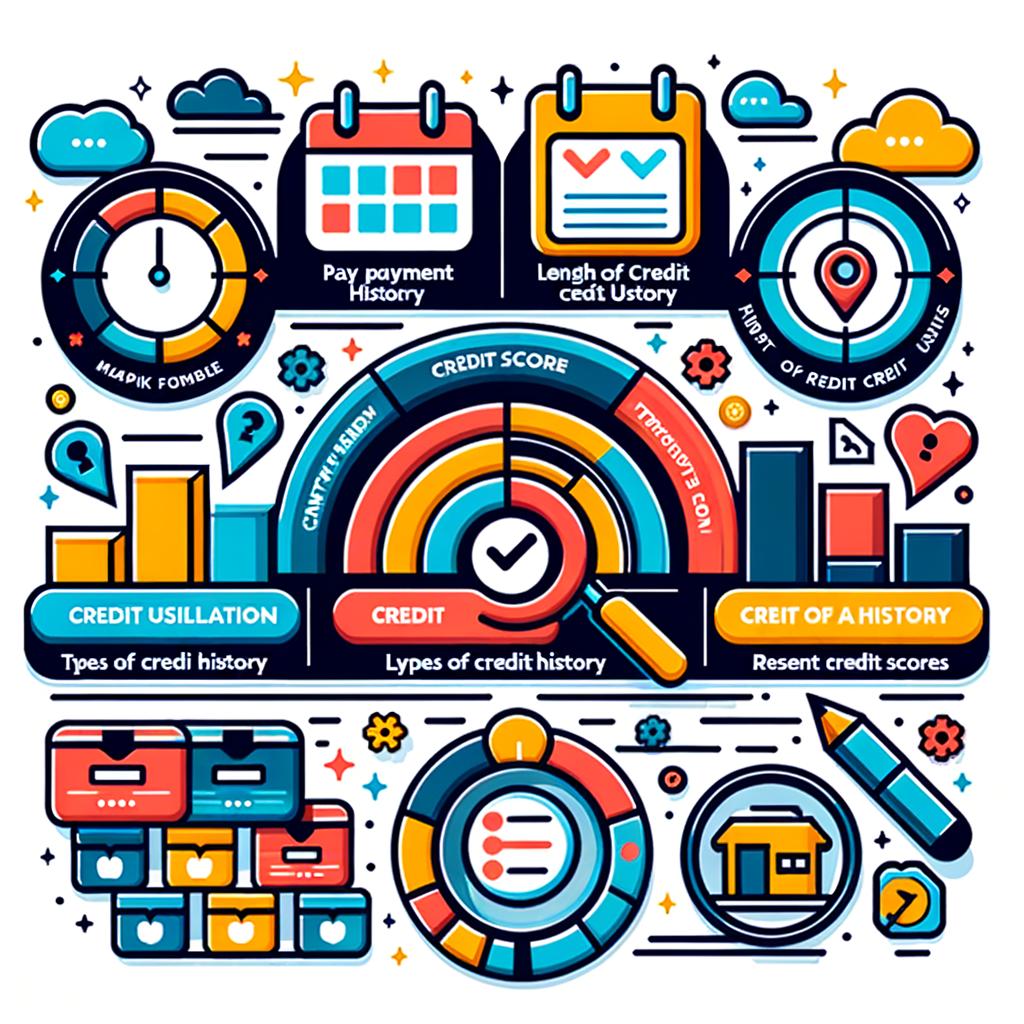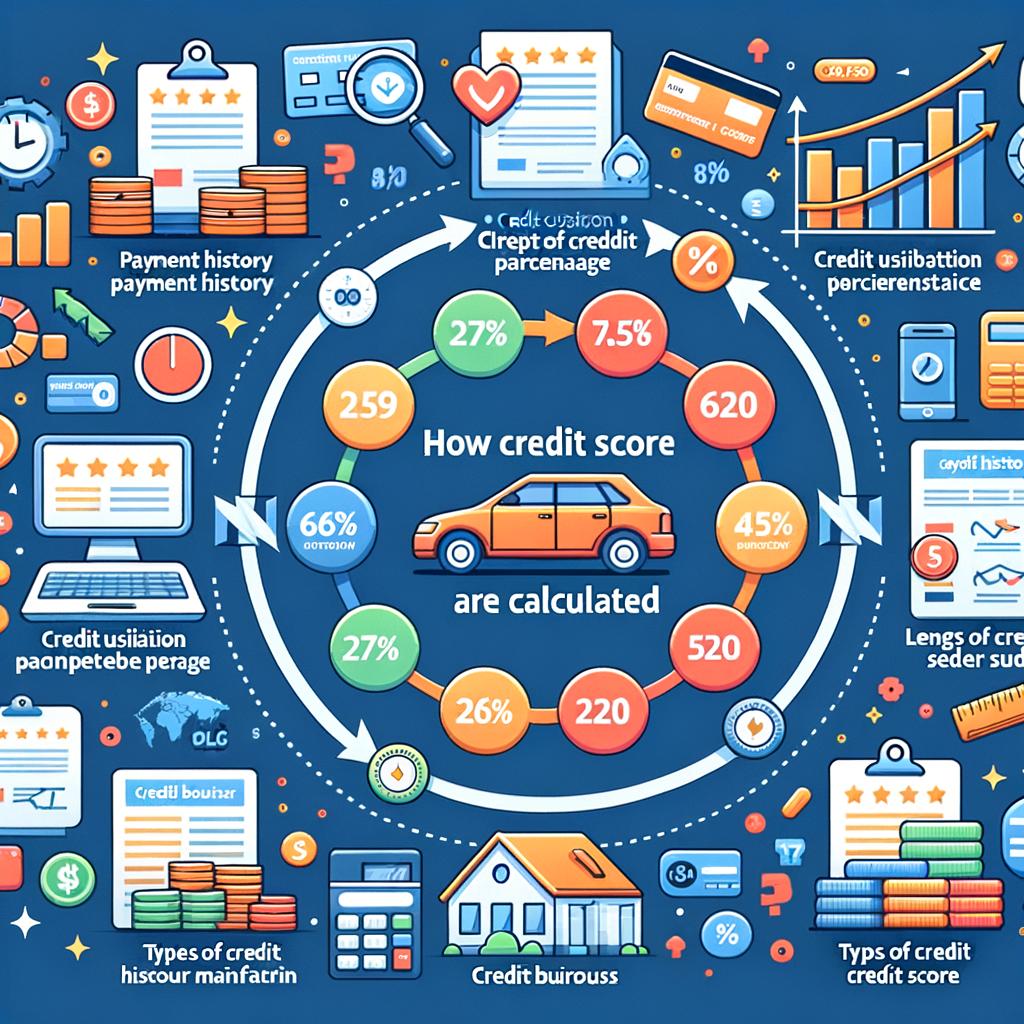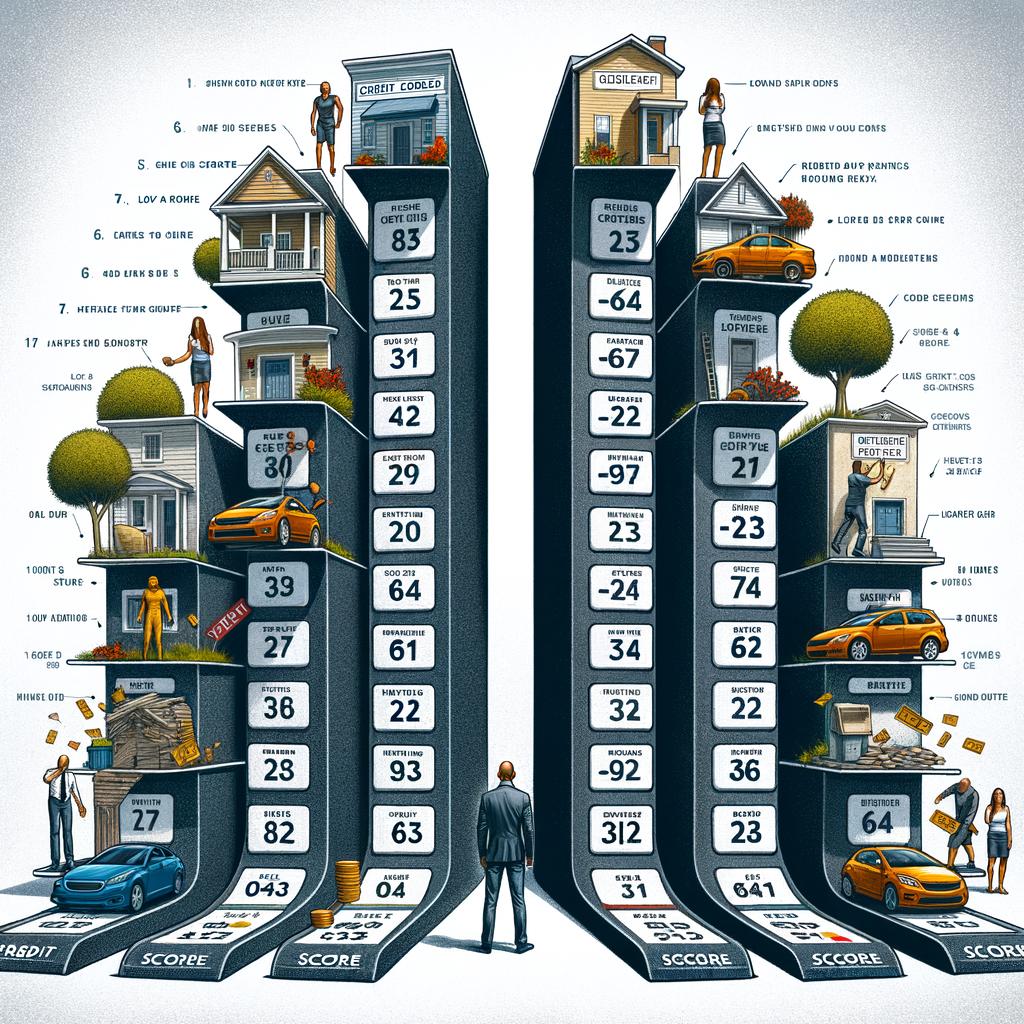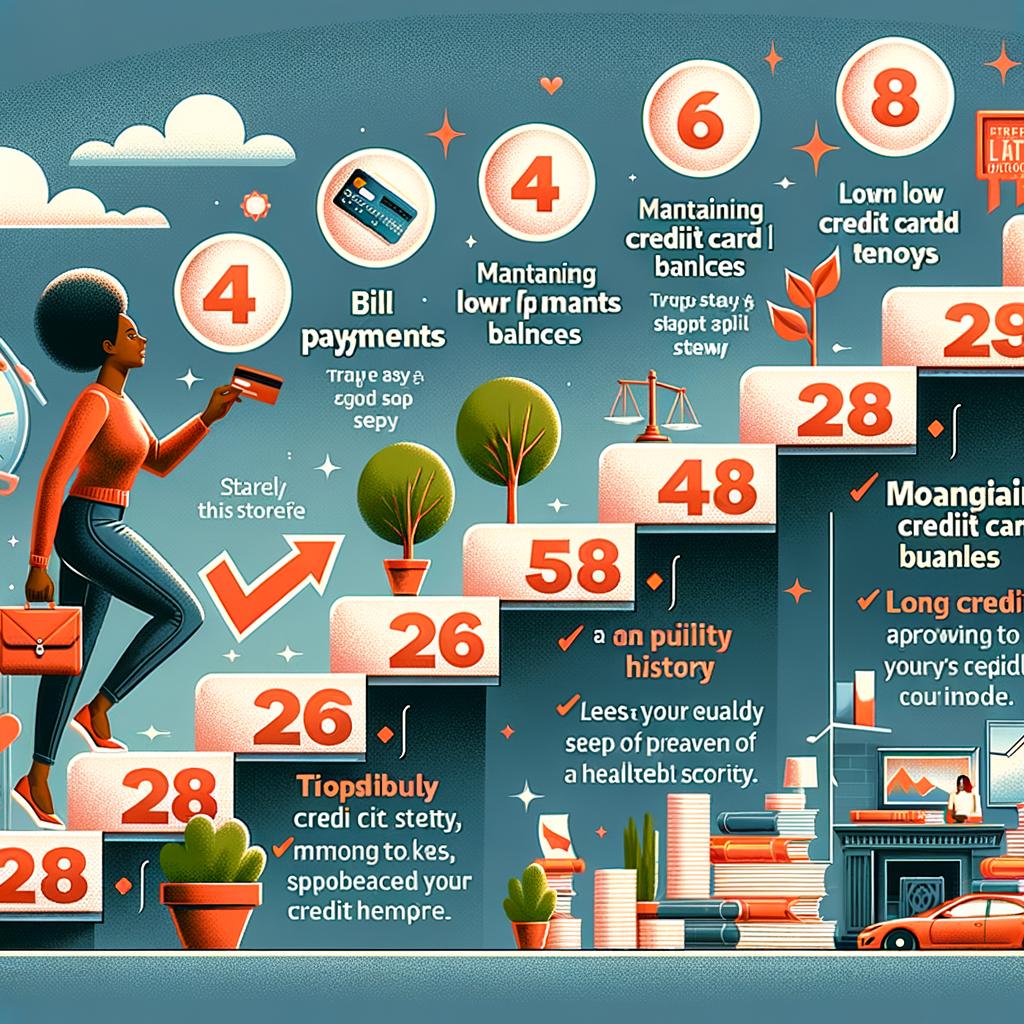In the intricate dance of personal finance, where numbers whisper stories of our financial health, one three-digit figure subtly wields immense power: the credit score. Invisible yet impactful, this numerical enigma influences everything from securing loans to making major life purchases. But what exactly is a credit score, how does it operate behind the scenes, and why should you, as a savvy financial navigator, care about it? Join us as we unravel the threads of this financial tapestry, shedding light on the mechanics of credit scores and uncovering the reasons why this seemingly obscure metric is a cornerstone of your financial landscape.
Table of Contents
- Understanding the Basics: What Makes Up Your Credit Score
- The Mechanics Behind Credit Scores: How They Are Calculated
- The Impact of Credit Scores on Your Financial Future
- Strategies to Improve and Maintain a Healthy Credit Score
- Q&A
- Concluding Remarks

Understanding the Basics: What Makes Up Your Credit Score
At the core of financial health lies your credit score, a three-digit number that holds significant sway over your financial life. But how exactly is this number calculated? To understand this, let’s break down the key components that come together to form your credit score.
1. Payment History (35%)
Your payment history is perhaps the most crucial element affecting your credit score. It reflects whether you’ve paid past credit accounts on time. Late payments, delinquencies, and bankruptcies can all lead to a lower score.
2. Amounts Owed (30%)
This component considers how much debt you currently have relative to your credit limits. High balances can suggest financial overextension, impacting your score negatively. The utilization ratio, or the percentage of total available credit being used, is a critical factor here.
3. Length of Credit History (15%)
The age of your credit accounts also matters. Generally, a longer credit history provides more data on your financial behavior and can improve your score. This includes the age of your oldest credit account, the age of your newest credit account, and an average age of all accounts.
4. Credit Mix (10%)
A diverse range of credit accounts, such as credit cards, mortgages, and installment loans, can positively influence your score. It shows you can manage various types of credit responsibly.
5. New Credit (10%)
Opening several new credit accounts in a short period can present you as a higher risk to lenders. Each application triggers a ”hard inquiry” on your credit report, which can slightly lower your score. Excessive new credit, especially if you lack a long credit history, can be particularly detrimental.
| Component | Weight |
|---|---|
| Payment History | 35% |
| Amounts Owed | 30% |
| Length of Credit History | 15% |
| Credit Mix | 10% |
| New Credit | 10% |
Understanding these components can provide valuable insights into how your credit score is determined. But it’s also crucial to know that FICO and VantageScore, the two major credit scoring models, might weigh these factors somewhat differently. Despite these variations, the foundational principles remain consistent.
Regularly monitoring your credit report can help you catch errors or signs of fraud early. Plus, it provides a snapshot of where you stand financially and areas that need improvement. By focusing on the key components of your credit score, you can manage and improve your financial health more effectively.

The Mechanics Behind Credit Scores: How They Are Calculated
Understanding how credit scores are calculated requires delving into various financial factors. These scores are generated using complex algorithms that take into account your financial behavior. Here’s a breakdown of the primary components that influence your credit score:
- Payment History: This element holds the most weight. It reflects your track record of paying back loans and credit card balances on time. Late payments, bankruptcies, and charge-offs can severely impact your score.
- Credit Utilization: Another significant factor is the ratio of your current debt to your credit limit. Keeping this ratio below 30% can positively affect your score; higher utilization can have the opposite effect.
- Length of Credit History: Longer credit histories provide more data for lenders to assess, impacting your score accordingly. This includes the age of your oldest account, the average age of all your accounts, and the age of the newest account.
- Credit Mix: Diversity in the types of credit you manage (credit cards, installment loans, mortgages) can influence your score, showcasing your ability to handle different financial obligations.
- New Credit Inquiries: Frequent applications for credit can be seen as a risk factor, potentially lowering your score. However, rate shopping for auto or mortgage loans within a short timeframe should count as a single inquiry.
To better understand the varies factors, here’s a simplified view of how they usually weigh into the calculation:
| Factor | Weight |
|---|---|
| Payment History | 35% |
| Credit Utilization | 30% |
| Length of Credit History | 15% |
| Credit Mix | 10% |
| New Credit Inquiries | 10% |
A nuanced factor that often flies under the radar is the impact of credit inquiries. Distinguishing between *hard* and *soft* inquiries can be crucial:
- Hard Inquiries: These occur when a lender reviews your credit report as part of the application process. They may slightly lower your score for a short period.
- Soft Inquiries: These checks do not affect your score. Examples include personal credit checks or pre-approved offers from lenders.
Another determinant influencing your credit score is the presence of *derogatory marks*. These include items such as bankruptcies, foreclosures, and accounts in collections. These negative marks can stay on your report for seven to ten years, making a noticeable dent in your credit health.
It’s crucial to periodically review your credit report for accuracy. Incorrect information, including misreported payments or identity theft issues, can unjustly lower your score. You can request a free credit report annually from major bureaus like Equifax, Experian, and TransUnion via AnnualCreditReport.com.
Achieving a robust credit score is akin to nurturing a garden; it requires time, consistency, and a proactive approach to managing and monitoring your financial habits. By understanding the different elements that contribute to your credit score, you can make more informed decisions to maintain or improve your financial health.

The Impact of Credit Scores on Your Financial Future
Credit scores can shape the course of your financial journey, impacting everything from loan approvals to interest rates. Here’s a closer look at how these pivotal numbers can influence your financial well-being, and why understanding them is crucial.
First and foremost, a credit score is a numerical representation of your creditworthiness. It’s derived from your financial history, encompassing factors such as your payment history, amounts owed, length of credit history, new credit, and types of credit used. This score, usually ranging from 300 to 850, assists lenders in assessing the risk of lending you money.
Why does this matter? A high credit score can open doors to better financial opportunities. Here’s how:
- Lower Interest Rates: Higher scores can help you secure loans at lower interest rates, saving you substantial money over time.
- Better Loan Approval Chances: Lenders are more likely to approve loan applications from individuals with high credit scores.
- Enhanced Rental Options: Landlords often check credit scores to evaluate potential tenants, so a good score can improve your chances of securing a desirable rental property.
Conversely, poor credit can be a barrier. It often results in higher interest rates, fewer loan approvals, and even issues securing a rental lease. **To understand the broader scope, consider the following table:
| Credit Score Range | Approval Likelihood | Typical Interest Rate |
|---|---|---|
| 750-850 | Very High | Low (4-6%) |
| 700-749 | High | Moderate (6-8%) |
| 650-699 | Moderate | High (8-12%) |
| 300-649 | Low | Very High (12-20%) |
One might wonder how to positively influence their credit score. It’s a mix of responsible financial behaviors and strategic planning. Key practices include:
- Paying bills on time.
- Maintaining low credit card balances.
- Avoiding unnecessary credit inquiries.
- Diversifying your credit types.
Monitoring your credit score regularly is also paramount. Numerous services offer free credit reports, making it easier than ever to keep an eye on your financial standing. This vigilance can help you spot errors or potential fraudulent activity, which, if left unchecked, could harm your score.
Moreover, understanding the factors that affect your score allows you to make more informed financial decisions. For instance, closing a long-standing credit card account might seem like a good idea, but it could negatively impact your credit history length, thus lowering your score.
Ultimately, your credit score is a crucial tool in the realm of personal finance. By nurturing and monitoring it, you can better navigate the complexities of the financial world, ensuring a more secure and prosperous future for yourself. Maintaining a positive score not only reflects well on your financial habits but also can significantly ease your financial decision-making in various life stages.

Strategies to Improve and Maintain a Healthy Credit Score
Maintaining a healthy credit score is crucial for financial success and flexibility. Here are some effective strategies to enhance and sustain your credit score over time.
Monitor Your Credit Report Regularly: It’s important to check your credit report frequently to ensure there are no errors or fraudulent activities. You can get a free copy of your credit report from each of the three major credit bureaus annually. Look for discrepancies or outdated information and dispute them immediately.
Pay Your Bills on Time: Payment history is a significant factor in your credit score. Consistently paying your bills on time demonstrates financial responsibility. Consider setting up automatic payments or calendar reminders to avoid missing due dates.
Keep Credit Card Balances Low: High credit card balances can negatively impact your credit score. Aim to use less than 30% of your available credit limit. Paying down balances can improve your credit utilization ratio, a key component of your credit score.
Diversify Your Credit Mix: Lenders like to see a variety of credit types, such as credit cards, installment loans, and mortgages. This diversity can positively influence your credit score. If you have only credit cards, consider adding an installment loan to the mix.
Limit Hard Inquiries: Each hard inquiry, such as those triggered by loan or credit card applications, can slightly lower your credit score. Be selective about applying for credit. Soft inquiries, like checking your own credit, do not affect your score and can be done regularly.
Use Old Credit Cards Wisely: The longer your credit history, the better. Keeping old credit accounts open, and using them occasionally, can help maintain a healthy credit length. Just ensure you don’t have inactive accounts that could be closed by the lender.
Create a Financial Plan: Establish a budget and stick to it. Understand your inflows and outflows and make sure you’re not overspending. This disciplined approach helps ensure you have the funds available to pay bills and manage debt efficiently.
Focus on Paying Down Debt: Prioritize paying off high-interest debt first. Consider using strategies like the avalanche or snowball methods to systematically reduce your debt. Less debt translates to a better debt-to-income ratio, which can positively affect your score.
Seek Professional Advice If Needed: If managing your credit and finances feels overwhelming, don’t hesitate to seek guidance from a financial advisor or counselor. They can offer personalized strategies to improve and maintain your credit score effectively.
Below is a table summarizing these strategies and their benefits:
| Strategy | Benefits |
|---|---|
| Monitor Credit Report | Identify and correct errors |
| Pay Bills on Time | Improves payment history |
| Keep Low Balances | Better credit utilization |
| Diversify Credit Mix | Shows financial responsibility |
| Limit Hard Inquiries | Prevents score drops |
| Use Old Cards | Lengthens credit history |
| Create Financial Plan | Ensures budget adherence |
| Pay Down Debt | Improves debt-to-income ratio |
| Professional Advice | Offers expert guidance |
Q&A
Certainly! Here’s a Q&A that could be included in an article about credit scores:
Q: What Exactly Is a Credit Score?
A: Imagine your credit score as a magic number that tells financial institutions how reliable you are when it comes to borrowing money. It’s a three-digit figure, usually between 300 and 850, that sums up your creditworthiness. The higher your score, the better you look to lenders.
Q: And How Does This Mysterious Number Work?
A: Well, your credit score is like a cake made from different ingredients – your payment history, the total amount you owe, the length of your credit history, types of credit you’ve used, and any new credit inquiries. These elements are mixed, weighted, and baked together to produce a number that flavors your financial life.
Q: Why Should I Even Care About My Credit Score?
A: Ah, great question! Your credit score is like your financial passport. It can open doors to competitive interest rates on loans and credit cards, help you rent an apartment, snag a good insurance rate, or even land you a job. On the flip side, a low score could cost you higher interest rates or deny you credit altogether. In essence, it’s a big deal.
Q: How Do I Keep My Credit Score in Good Shape?
A: It’s all about healthy habits. Pay your bills on time, keep your debt levels low, avoid opening too many new credit accounts at once, and routinely check your credit report for errors. It’s not instant magic, but diligence pays off.
Q: What Happens If My Credit Score Drops?
A: If your credit score drops, it’s like hitting a financial speed bump. You might find it harder to qualify for loans or receive favorable rates. But fear not! With some effort, like paying down debt and meeting payment deadlines, you can bounce back.
Q: Is There a Perfect Score?
A: While an 850 is the equivalent of a financial unicorn, it’s not necessary for most lending scenarios. Generally, a score above 700 is considered good, and anything above 800 is excellent. Aim high, but remember, perfection isn’t required to reap the benefits.
Q: Can I See My Credit Score for Free?
A: Yes! There are several ways to catch a glimpse of your credit score without spending a dime. Websites like Credit Karma or Credit Sesame offer free access, and some banks and credit card companies provide it as a perk.
By understanding your credit score, you can unlock a world of financial opportunities. Treat it well, and it’ll reward you in kind.
Concluding Remarks
Like the final note of a symphony, understanding your credit score brings clarity to the financial ensemble of your life. It’s not just a number; it’s a reflection of your financial journey, a beacon that guides lenders, and a compass for your financial aspirations. By demystifying the intricacies of how your credit score works and recognizing its profound importance, you empower yourself with the knowledge to navigate future financial landscapes with confidence. So, the next time you ponder over your credit score, remember: it isn’t just about where you stand, but where you can go. Here’s to making informed choices and crafting a sound financial future!
